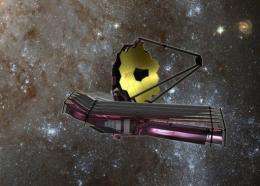Rockets, doughnuts could face ax in US budget cuts

Hundreds of millions of US taxpayer dollars have been wasted on everything from doughnuts to rockets, auditors told Congress Thursday as budget-minded lawmakers prepared to slash science funding.
For example, hundreds of millions of dollars are being spent each month on a NASA program to return Americans to the moon, even though the US space agency, Congress and President Barack Obama have agreed not to proceed with it.
Old, rundown buildings are draining 300 million dollars a year from NASA in repair costs alone, and at least one space telescope project has run billions over budget, more than four times initial estimates.
The National Science Foundation, a 6.9 billion dollar federal agency that disperses grants to researchers, also came under the microscope as the House of Representatives held hearings on how to get rid of waste and fraud.
NSF is spending 500,000 dollars per year on refreshments at meetings, even though attendees are already compensated for food and other expenses, Inspector General Allison Lerner said.
Other problems include the way the agency spends half of its budget for contracts, or 204 million dollars, on pay-in-advance schemes in which contractors get paid ahead of time whether the work is finished or not.
"The risk of fraud, waste and abuse by NSF contractors will continue to be high until NSF implements fully adequate cost surveillance procedures," she told the House Appropriations Subcommittee on Science, State, Justice and Commerce.
A recent audit of large construction projects undertaken by NSF revealed more than 169 million dollars in "unallowable contingency costs," because "no barriers existed to prevent the funds from being drawn down in advance," she said.
"I am beginning to think it is a very sloppy operation out there," said Congressman Frank Wolf, the Republican chair of the subcommittee.
Republicans, who have a majority in the House but not the Senate, have vowed to press for the biggest budget cuts in history.
On Wednesday, they unveiled a plan to cut tens of billions dollars from the budget, as the US national debt runs to 14 trillion dollars with a 1.5 trillion dollar yearly government deficit.
The reductions, including a 379 million dollar cut for NASA and a 139 million dollar cut for NSF, would figure in a House spending bill to fund the government through the end of the fiscal year, in place of a stopgap measure approved last year that expires March 4.
According to Inspector General Paul Martin, an independent auditor who testified about NASA, the space agency's central "conundrum" is due to that temporary budget extension.
Martin explained it contains old language that "doesn't allow NASA to terminate the Constellation program," which included the now nixed Ares rockets and Orion spacecraft to replace the retiring space shuttles.
Lawmakers should take immediate action to correct this "continuing lack of clarity caused by conflicting legislative directives," Martin told the subcommittee.
Otherwise, NASA will keep spending money on rockets to nowhere, for a total of 215 million dollars by the end of February and 575 million dollars by the end of the fiscal year, he said.
Another major NASA project, the James Webb Space Telescope, has careened billions of dollars over budget and needs 500 million dollars more to be completed by 2015, Martin said.
Initial estimates put the cost of the telescope, designed to help the hunt for knowledge about early galaxies in the universe, at 1.6 billion dollars, but now the total price tag has risen to 6.5 billion dollars, he said.
"For some projects, it really is rocket science. The engineering required for many of NASA's space and engineering projects is complex and visionary but the agency must do a better job of managing cost and schedule," Martin said.
Democratic lawmaker Chaka Fattah echoed other members of the subcommittee when he said the Congress supports NASA's mission to advance knowledge of space, but is keen to find ways to trim overblown budgets.
"We need to stop spending money on something we do not want to do," Fattah said. "That is not rocket science."
But when it came to the food treats being offered to scientists, Fattah was less certain.
"In defense of the coffee and doughnuts, I would say there are probably some areas you can cut but I am not sure we should be inviting the most knowledgeable scientists in the world to talk about a cure for cancer and not offer them coffee," he said.
(c) 2011 AFP




















